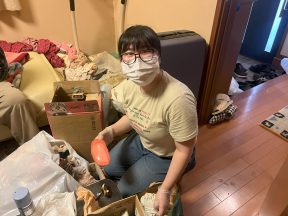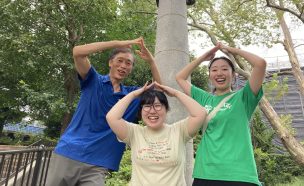Project HomeWorks (PHW) is a domestic housing support program made possible with the support of volunteers. In August, Ms. Chihiro Aizawa, originally a campus chapter member who now works with Habitat Japan as an intern supporting our Youth Program, volunteered with PHW for her second time.
This session, Ms. Aizawa assisted Uesugi-san (alias). Who lives alone in their fifties with a mental disability. Uesugi-san has lived alone ever since their mother, who used to live together with them, moved into an elderly care facility. To help organize things and clean up the space in which they now live alone, Uesugi-san contacted Habitat Japan for support.
Following the PHW session, Ms. Aizawa told us that through this volunteer work, she gained insight into building relationships with others. Please read Aizawa’s full thoughts below.

When I heard that the home partner we would be helping had a disability, the first things that came to mind was a friend of mine from elementary school.
This friend lived near me and we went to elementary school every morning for six years. We didn’t have classes together, but I would often go to visit him in his special needs class. He loved movies, which influenced me to start watching them too and we would have fun talking about them.
Around middle school I was made aware of disabilities and was educated to “be polite to people with disabilities”. I suddenly became unsure of how to treat my friend, and we began to grow distant with him eventually starting to call me by my surname, Aizawa, until we graduated middle school and grew apart.
When I learned that our home partner Uesugi-san was living alone and had a disability, I wondered if they would be able to live on their own. However, when we visited their home Uesugi-san came to the front door, showed us to their room, and was able to give clear instructions on what things they wanted to keep and what things they wanted to throw away. At first they seemed nervous, but as I and other volunteers made conversation with them and complimented their mothers’ collection of clothes, Uesugi-san gradually began to relax. The PHW session only lasted two hours, but by the time it was over, we forgot that Uesugi-san was a “person with a disability” and instead were talking to them as we would any other friend.

At that time, I shared my thoughts with a social worker who accompanied us in helping Uesagi-san. I told her that “In the future, I want a job that supports people, regardless of whether they have disabilities or not.” The social worker then told me “So long as one looks at those with disabilities through the lens of them being “disabled”, there is no way to overcome that classification. If you take that lens away and view the person as who they are, you can see what challenges they face and begin building a relationship from there.”
In elementary school, I didn’t have a frame of reference as to what a “person with disabilities” was. But as I grew older, an image of people with disabilities was built up and before I knew it I was viewing people through that lens-- I think that this applies to many things besides just disabilities. My experience volunteering with PHW allowed me to have interactions and gain insights that I would not have had otherwise in my daily life.
Habitat Japan has plans to continue supporting Uesagi-san, and we’re excited to meet new volunteers in the process. Check our volunteer openings for September here.
